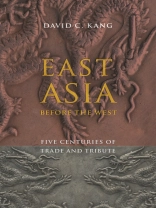From the founding of the Ming dynasty in 1368 to the start of the Opium Wars in 1841, China has engaged in only two large-scale conflicts with its principal neighbors, Korea, Vietnam, and Japan. These four territorial and centralized states have otherwise fostered peaceful and long-lasting relationships with one another, and as they have grown more powerful, the atmosphere around them has stabilized.
Focusing on the role of the ‘tribute system’ in maintaining stability in East Asia and in fostering diplomatic and commercial exchange, Kang contrasts this history against the example of Europe and the East Asian states’ skirmishes with nomadic peoples to the north and west. Although China has been the unquestioned hegemon in the region, with other political units always considered secondary, the tributary order entailed military, cultural, and economic dimensions that afforded its participants immense latitude. Europe’s ‘Westphalian’ system, on the other hand, was based on formal equality among states and balance-of-power politics, resulting in incessant interstate conflict.
Scholars tend to view Europe’s experience as universal, but Kang upends this tradition, emphasizing East Asia’s formal hierarchy as an international system with its own history and character. This approach not only recasts our understanding of East Asian relations but also defines a model that applies to other hegemonies outside the European order.
Table of Content
List of Illustrations and Tables
Preface
1. The Puzzle: War and Peace in East Asian History
2. Ideas: Hierarchy, Status, and Hegemony
3. States: The Confucian Society
4. Diplomacy: The Tribute System
5. War: The Longer Peace
6. Trade: International Economic Relations
7. Frontiers: Nomads and Islands
8. Lessons: History Forward and Backward
Notes
Bibliography
Index
About the author
David C. Kang is professor of international relations and business and director of the Korean Studies Institute at the University of Southern California. A regular consultant for both multinational corporations and U.S. government agencies, his books include
China Rising,
Crony Capitalism, and
Nuclear North Korea: A Debate in Engagement Strategies.












